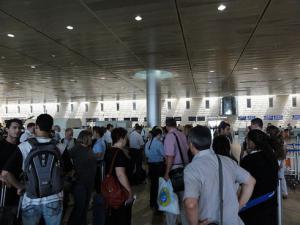Airport securityAirport executives from forty countries to visit Israel for security lessons
With concern rising after a string of terror attacks, airport representatives from forty countries will visit Israel’s Ben-Gurion International Airport next month to learn about Ben-Gurion’s security procedures. Ben-Gurion is one of the world’s safest airports — no flight departing Israel has ever been hijacked, and there has not been a terrorist attack at Ben-Gurion since 1972.

Passengers awaiting security interview at Ben Gurion Airport // Source: commons.wikimedia.org
With concern rising after a string of terror attacks, airport representatives from forty countries will visit Israel’s Ben-Gurion International Airport next month to learn about Ben-Gurion’s security procedures.
Ben-Gurion is one of the world’s safest airports — no flight departing Israel has ever been hijacked, and there has not been a terrorist attack at Ben-Gurion since 1972. The layers of security are largely unnoticed by the more than sixteen million passengers who arrive and embark there annually.
The first layer occurs in Ben-Gurion’s Airport Security Operations Center, which monitors every flight in the area and conducts background checks on every passenger and flight crew scheduled to pass through Israeli airspace. Around ten flights per day are flagged for security irregularities and checked further, Dvir Rubinshtein, operations center manager for the Israeli Ministry of Transportation, explained to CNN. “There is, every day, a situation where we have such concerns [about a flight],” he said, “and we check that and verify that everything is security cleared.”
Because of its record, other nations are looking into adopting Israeli security methods for their airports. “Most of the countries are actually coming here often to see how Israel is dealing with security aviation and the threats from terror aviation,” Rubinshtein said.
Aviation security expert Shalom Dolev told CNN that “some [of Ben-Gurion’s] fundamental principles and some best practices can be deployed in other parts of the world,” but because of its relatively smaller size, “it’s not a copy and paste because it’s not a situation where one size fits all.”
For example, Ben-Gurion handles about 20 percent of the passenger traffic of London’s Heathrow airport and 15 percent of the traffic handled by Atlanta’s Hartsfield-Jackson International Airport, which just signed a cooperation agreement with Ben-Gurion. (Heathrow is also reportedly considering adopting Israeli airport security methods.)
In February, Israel added a new security directive to airlines traveling to Israel in order to address other potential threats to flights, such as from “insiders that are working at resorts and may have access to the luggage of passengers, insiders that may work at airports or even in cabin crew,” Dolev said. “And last but not least, the phenomenon we are facing since the early-90s of suicide pilots.”
Dolev emphasized that Israeli airport security is ultimately at an advantage against threats because they “are more flexible, more dynamic to respond to emerging threats and respond effectively.”
This article is published courtesy of The Tower
